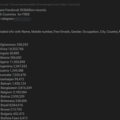
The Docker company is going to remove one of its membership forms. Users in that form can no longer access their data, unless they take out a paid membership. At first images also seemed to be removed, but the company came back to that later.
It’s about the Docker Free Teams membership. As the name suggests, it is characterized by multi-author access and the fact that it is free. This membership has long been unavailable to new Docker users; only users who already had it before it was deprecated are now affected. The migration deadline is April 13.
The initial communication stated that ‘organizational data’ of teams with this membership would be deleted after 30 days. The company later came back and clarified that that data will be deleted, but that the images will be left alone. Users on Hacker News have criticized that this makes the “latest” tag useless and dangerous; if the development team cannot switch to another membership, the images will no longer receive updates and latest will automatically become obsolete.
Docker says these teams may be able to transition to Docker-Sponsored Open Source, or DSOS. In addition, the teams receive a free Docker Team subscription for one year, but are never allowed to monetize their software. Only donations for running costs are allowed. Switching memberships to another subscription is also possible, but the Team membership costs a minimum of $ 300 per year. You may also be able to migrate to a free membership with fewer options; Docker says users will need to create a support ticket for that.
Both users and developers who maintain repos with Docker are not happy with the news. Developers say they are put in a difficult situation because of their images, but also the images of others they rely on. Users are at risk because images they are using could suddenly grind to a halt if the developer cannot successfully evade. And if the developer switches to Githubs Container Registry, for example, then the url of the image still has to be adjusted, which also requires that the end user is informed.
Docker states in an update to its disclosure that “only 2 percent of users are affected,” but that’s probably about 2 percent of developers using Docker repos, not 2 percent of all Docker users, including clients that only use Docker. retrieve images. Images of two percent of repo maintainers can still experience a lot of pulls.
The issue is discussed in two posts on Hacker News, a blog post by a prominent member of the Docker community, an article on DevClass, and a GitHub issue, among others . Docker’s initial disclosure was an email referring to a PDF , but an additional disclosure has also been made. The PDF has been updated in between, so commentary on Docker’s actions may seem outdated.
Docker is a platform where developers can host software images, which users run in containers . The usp of this system is that the necessary dependencies for the software that is distributed can be bundled in the images. For example, even software originally developed for another operating system can run on platforms supported by Docker.











